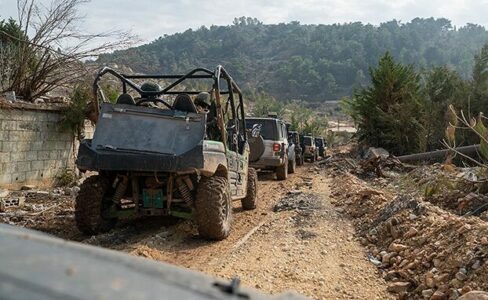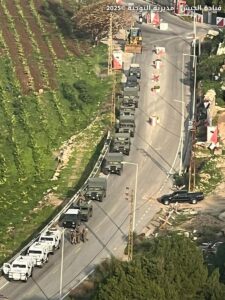With around three weeks left until the end of the Israeli ceasefire with Hezbollah, it is still unclear if the Israel Defense Forces (IDF) will honor the United States-brokered agreement and withdraw from Lebanese territories.
On January 4, the United Nations Interim Force In Lebanon (UNIFIL) accused the IDF of destroying a blue barrel marking the border between Israel and Lebanon, as well as a Lebanese army observation tower near one of the peacekeeping force’s positions.
“This morning peacekeepers observed an IDF bulldozer destroying a blue barrel marking the line of withdrawal between Lebanon and Israel in Labbouneh, as well as an observation tower belonging to the Lebanese Armed Forces immediately beside a UNIFIL position there,” the force said in a statement.
UNIFIL noted that the IDF’s “deliberate and direct destruction” of the blue barrel and Lebanese army infrastructure is a “flagrant violation of Resolution 1701 and international law.”
“We call on all actors to avoid any actions, including the destruction of civilian property and infrastructure, that could jeopardize the cessation of hostilities,” the force added.
On the same day, the Hezbollah-aligned Al-Akhbar newspaper reported that the Lebanese military officials had received “serious signals” from the U.S. military official tasked with overseeing the ceasefire that the IDF could extend its presence in south Lebanon for an additional 30 days.
The agreement, which entered into effect on November 27, is supposed to last for just 60 days, and ends with a permanent ceasefire.
According to the newspaper, the message sent by Major General Jasper Jeffers, Special Operations Command Central to the Lebanese military, is that the decision depends on whether Israel can “fulfill its goals of ensuring the end of [Hezbollah’s] ability to carry out a preemptive attack.”
Israel’s Kan public broadcaster also reported that the IDF may delay its withdrawal from south Lebanon because the Lebanese army is not meeting its terms of the ceasefire and is deploying too slowly in the area, with Hezbollah regrouping.
On January 5, an Israeli official told The Times of Israel that Israel was talking tough about remaining in Lebanon after the end of the ceasefire to pressure the Lebanese military to fulfill their obligations before the period ends.
Israel would very much prefer to have Lebanese troops deploy across southern Lebanon and ensure that Hezbollah retreats fully from the area, the unnamed official said.
“We don’t think that we’ll have the full backing of the US to break the ceasefire,” said the official. “The feeling is that there’s no point in reopening that front.”
On the same day, Israel’s Defense Minister Israel Katz warned that if Hezbollah does not withdraw from southern Lebanon “there will be no agreement,” and Israel will be forced to act.
“Israel is interested in the implementation of the agreement in Lebanon and will continue to enforce it fully and without compromise to ensure the safe return of the residents of the north to their homes,” Katz said during a visit to an IDF base in northern Israel.
“But the first condition for the implementation of the agreement is the complete withdrawal of the Hezbollah terror organization beyond the Litani River, the dismantling of all weapons, and the [removal] of the terror infrastructure in the area by the Lebanese army, something that hasn’t happened yet,” he continued.
“If this condition is not met, there will be no agreement, and Israel will be forced to act independently to ensure the safe return of the residents of the north to their homes,” Katz added.
On January 6, the Lebanese military announced that it had deployed to some areas in the western sector of southern Lebanon after the IDF withdrew.
In a post on the X social network, the military said that its troops deployed to areas surrounding the border town of Naqoura, in coordination with UNIFIL. It added that it will soon begin surveying the town to remove any unexploded ordnance left behind from the fighting between the IDF and Hezbollah.
The deployment was confirmed later on the same day by the U.S. envoy Amos Hochstein who was visiting Lebanon.
“The Israeli military started its withdrawal from Naqura…and back into Israel proper today, south of the Blue Line. These withdrawals will continue until all Israeli forces are out of Lebanon completely, and as the Lebanese army continues to deploy into the south and all the way to the Blue Line,” Hochstein told reporters.
All in all, it is still unclear if Israel will adhere to the ceasefire brokered by the U.S. Any Israeli attempt to violate the agreement could reignite clashes with Hezbollah. The group’s Secretary-General warned in a recent speech that he may run out of patience.
MORE ON THE TOPIC:









first, the zionist entity will do whatever it likes, whenever it likes. second, hezbollah and iran leaderships showed their lack of military ability by spending a year wasting their chances, their lack of moral courage by them gifting israel a land victory by accepting a cease-fire promoted by their enemy’s main backer, one to which they are not even a party. hezbollah’s land forces ‘outstanding competence could not offset the failings at the top.
well done analysis. hezbollah is a paper tiger. but so is israel also. its a parasite regime that only exists because we have shabbosgoy traitors in our governments who send our surplus to israel and who enect hate speech laws that protect these jewish filth from any critisizem by us whatsoever. its time we all name the jew. and take back our own sovereignty
who do you think you’re kidding as if this sites not promoting anti semitic neo nazi style genocidal jewish hate speech at every opportunity .
that is what a jew would say, you parasites are a scourge on humanity, you have never contributed anything only stole plagarized and sabotaged. all our development is despite all the sabotage destuction famines wars your demon kind has caused. if not for your existence we could have colonized the stars.
very creative a whole new fake name today one if many you are good at fiction aren’t you. i do like how you create the new fake names to match the comment that’s very duplicitous isn’t it.
yes and then you could have ruled the whole universe in your magic circle sun club. hahahaha omg hahahaha ha
the great development and scientific achievement cultural achievement under the few years germany had liberated its self from the jewish cancer are a testiment were as humanity as a collective could have could have been if you jews had not had control over our governments institutions and education systems. you jews subvert and poison everything. woke transgender massive immigration feminism everything designed to destroy us.you jews are the destroyers.
oh have you been training up in propaganda 101 for dummies?
all wars in the middle east are of you jews the making all the pain and suffering the people of syria lebanon, iraq iran, your closest cousins the palestinians have endured are of your jewish making. you jews enjoy torturing and murdering children you enjoy it when you see palestinians suffer.
its time we as humanity as a collective wake up set aside our differences and unite and purify our governments and countries and instituions from your cancer.
you do realise the middle east was at war before forever even in the time where the jews had no power there you know more then 1000 years…
but as far as people with foreing interest not beeing involved in politics of a country im all for it not just limited to jews. look at the french women trying to push georgia to go hostile towards russia despite knowing the consequenzes.
jews have always created wars from behind the scenes subverting sabotaging and poisoning people playing everyone off against eachoter.
well, i’m glad we’ve got all that sorted out. but from a foreign policy perspective, with friends like israel you don’t need enemies, so those who would sup with them must needs use a long spoon. nor do any of these changes do anything but harm to the locals; less rich jews included, since robber barons are not minded to share the plunder.
don’t tease him with truth he won’t like that.
jews are no better then the nazis. murdering scum.
you’re really not very good at actually deceiving anyone though are you? is that intentional or just lack of effort?
it makes so much more sense when you realize the kikes and fagmasons were absolutely integral to the rise of nazism. they raise up anti-kike sentiments and false flags/hoaxes — with people like soros determining which people suffer while they live in comfort — so that the reaction will be for more sympathy for kikes. jews of god behave nothing like kikes. there are almost no jews alive, just a bunch of kikes claiming to be jews.
hahahaha so transparent congratulations trollope of multiple identities working hard hahahaha
if you’re looking for genocidal hate speech, look at the publicly announced extermination programme for gaza.
cracking a wobbly today are we troll-bot ?
what a load of utter bollocks .if they could do what they liked the entire world would be totally different. obviously for a start they wouldn’t have hostages in gaza right now .et etc grow up .
for the isrealis governments the hostages are the same as isis in syria to the usa. as long as they exist they have legitimacy to do as they please. sadly it is not in the interest of the isreali government for the hostages to ever return until all wargoals the government has are fullfilled.
unfortunately you’re not aware of reality in a way your correct as bibi was almost 50 years ago when in an interview he predicted very accurately how this would all play out. him with his blue eyes and his sandy blonde hair.
the ones in power will never ever truly care about the hostages. they care for nothing but themselves and other people only fit into the equation as pawns to be manipulated for their pleasures. when other people pressure them, they will do actions to appease them if and only if they must. their attempts at appeasing are wholly inadequate because they are incapable of empathy. the lazy cowards of earth let themselves be ruled by such scum almost everywhere; a lesson from god in itself.
what ceasefire?
illiterate hezbollah terrorists only knew one thing : allahu akbar.
basta de cessar-fogo, basta dessa mentira. hezbollah volte a atacar israel já!!!
looking forwar to seeing the khazar and the turkeys tear each other apart. like mafia filth they deserve each other.